| Listing 1 - 10 of 15 | << page >> |
Sort by
|
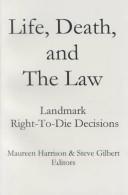
ISBN: 1880780135 Year: 1997 Publisher: San Diego (Calif.): Excellent books
Abstract | Keywords | Export | Availability | Bookmark
 Loading...
Loading...Choose an application
- Reference Manager
- EndNote
- RefWorks (Direct export to RefWorks)
Right to die --- Cases
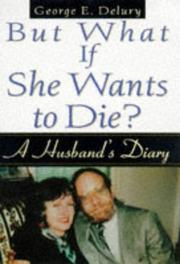
ISBN: 1559724110 Year: 1997 Publisher: Secaucus Carol publ. group
Abstract | Keywords | Export | Availability | Bookmark
 Loading...
Loading...Choose an application
- Reference Manager
- EndNote
- RefWorks (Direct export to RefWorks)
A man who was sentenced to six months in prison for assisting in the suicide of his wife shares his personal diary, in which he agonizes over his decision to aid his wife, who was suffering from multiple sclerosis.
Assisted suicide --- Right to die --- Delury, George E. --- Lebov, Myrna.
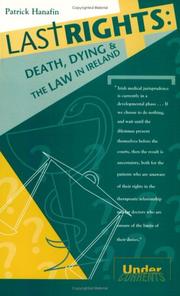
ISBN: 1859181562 Year: 1997 Publisher: Cork Cork university press
Abstract | Keywords | Export | Availability | Bookmark
 Loading...
Loading...Choose an application
- Reference Manager
- EndNote
- RefWorks (Direct export to RefWorks)
Right to die --- Terminally ill --- Law and legislation --- Legal status, laws, etc
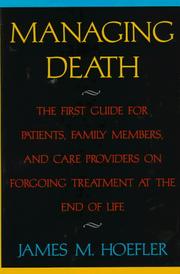
ISBN: 0813328160 0813328179 Year: 1997 Publisher: Boulder Westview
Abstract | Keywords | Export | Availability | Bookmark
 Loading...
Loading...Choose an application
- Reference Manager
- EndNote
- RefWorks (Direct export to RefWorks)
Drawing on American case studies, interviews and research, this is an examination of the medical, legal, ethical and clinical aspects of right-to-die issues. It is intended for professionals, students, and general readers facing questions about an individual's right to die.
Right to die --- Terminal care --- -#GBIB:CBMER --- levenseinde (einde van het leven, levenseindebeslissing) --- godsdienst (religie, religieuze aspecten) --- menswaardigheid (waardigheid) --- kunstmatige voeding en hydratatie --- stopzetting van behandeling --- permanent vegetatieve status (PVS) --- dementia --- End-of-life care --- Terminally ill --- Care of the sick --- Critical care medicine --- Death --- Death, Right to --- Death with dignity --- Natural death (Right to die) --- Life and death, Power over --- Advance directives (Medical care) --- Do-not-resuscitate orders --- Euthanasia --- Suicide --- Moral and ethical aspects --- fin de vie (décision de fin de vie) --- religion (aspects religieux) --- dignité humaine --- alimentation et hydratation artificielle --- arrêt de traitement --- état végétatif permanent --- démence --- Care and treatment --- Medical care --- Right to die. --- Moral and ethical aspects. --- #GBIB:CBMER
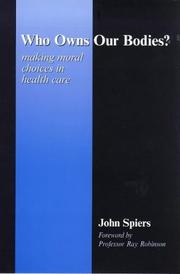
ISBN: 1857752104 Year: 1997 Publisher: Oxford Radcliffe Medical Press
Abstract | Keywords | Export | Availability | Bookmark
 Loading...
Loading...Choose an application
- Reference Manager
- EndNote
- RefWorks (Direct export to RefWorks)
Explores dilemmas at the intersection of medicine, philosophy and law. Addressing euthanasia, abortion, and the care of groups including the elderly, the demented, and children, the author identifies a crisis both in ethics and in empowerment. This book explores the controversial dilemmas which meet at the intersection of medicine philosphy and law - questions concerning killing and not killing which are faced daily in health care. They embrace euthanasia, abortion, the care of the elderly and the demented, the care of the mentally ill children and those in a persistent vegative state. Who Owns our Bodies? identifies a crisis both in ethics and in empowerment as people face often neccessarily wretched choices. It seeks a framework of guidance for practical decision-making and focuses on two key issues. First who decides on an individual's quality of life and thus on their health care treatments? Second how can patients be empowered with a structure to enable choice, self-realization, self-reflection and self-responsibility? John Spiers with characteristic clarity and verve offers a fundamental choice between health care experienced as hierarchy and control and the alternative of choice and self-responsibilty. He argues that health care must rely on patients deciding how much power they have, not on professionals deciding how much to grant them.
Death --- Euthanasia --- Right to die --- Terminal care --- patiëntenrechten (rechten van de patiënt) --- Right to Die --- Brain Death --- Ethics, Medical --- Informed Consent --- Consent, Informed --- Treatment Refusal --- Mental Competency --- Disclosure --- Therapeutic Misconception --- Medical Ethics --- Medicine --- Professionalism --- Bioethics --- Irreversible Coma --- Brain Dead --- Coma Depasse --- Brain Deads --- Coma, Irreversible --- Death, Brain --- Death with Dignity --- Dignity, Death with --- Advance Directives --- Living Wills --- Death, Right to --- Death with dignity --- Natural death (Right to die) --- Life and death, Power over --- Advance directives (Medical care) --- Do-not-resuscitate orders --- Suicide --- Moral and ethical aspects --- droits du patient --- ethics --- Professional ethics. Deontology --- Human medicine
Book
ISBN: 3906757250 Year: 1997 Publisher: Bern Lang
Abstract | Keywords | Export | Availability | Bookmark
 Loading...
Loading...Choose an application
- Reference Manager
- EndNote
- RefWorks (Direct export to RefWorks)
Euthanasia --- Right to die --- Suffering --- #GBIB:Overlegcentrum Christelijke Ethiek --- 253:362.1 --- 253:362.1 Pastoraal voor zieken, ouderen en stervenden --- Pastoraal voor zieken, ouderen en stervenden --- Affliction --- Masochism --- Pain --- Death, Right to --- Death with dignity --- Natural death (Right to die) --- Death --- Life and death, Power over --- Advance directives (Medical care) --- Do-not-resuscitate orders --- Suicide --- Informed consent (Medical law) --- Medical laws and legislation --- Assisted death (Euthanasia) --- Assisted dying (Euthanasia) --- Death, Assisted (Euthanasia) --- Death, Mercy --- Dying, Assisted (Euthanasia) --- Killing, Mercy --- Mercy death --- Mercy killing --- Homicide --- Medical ethics --- Assisted suicide --- Religious aspects&delete& --- Christianity --- Law and legislation --- Social aspects --- Philosophical anthropology --- Natural law --- Religious aspects
Book
ISBN: 2911606140 Year: 1997 Publisher: Paris : Editions Noêsis,
Abstract | Keywords | Export | Availability | Bookmark
 Loading...
Loading...Choose an application
- Reference Manager
- EndNote
- RefWorks (Direct export to RefWorks)
Euthanasia --- Right to die --- Death --- Pain --- Euthanasie --- Droit à la mort --- Mort --- Douleur --- Life and death, Power over --- 179.7 --- 614.253.8 --- Death, Power over --- Power over life and death --- Ethics --- Free will and determinism --- Liberty --- Punishment --- Droit à la mort

ISBN: 0198259964 Year: 1997 Publisher: Oxford Clarendon
Abstract | Keywords | Export | Availability | Bookmark
 Loading...
Loading...Choose an application
- Reference Manager
- EndNote
- RefWorks (Direct export to RefWorks)
Margaret Otlowski investigates the complex and controversial issue of active voluntary euthanasia. She critically examines the criminal law prohibition of medically administered active voluntary euthanasia in common law jurisdictions, and carefully looks at the situation as handled in practice. The evidence of patient demands for active euthanasia and the willingness of some doctors to respond to patients' requests is explored, and an argument for reform of the law is made with reference to the position in the Netherlands (where active voluntary euthanasia is now openly practiced).
Euthanasia --- Euthanasie --- Law and legislation --- Droit --- #GBIB:CBMER --- euthanasie --- common law (gewoonterecht) --- rechtsvergelijking --- Nederland --- coutume (droit coutumier) --- droit comparé --- Pays-Bas --- Assisted death (Euthanasia) --- Assisted dying (Euthanasia) --- Death, Assisted (Euthanasia) --- Death, Mercy --- Dying, Assisted (Euthanasia) --- Killing, Mercy --- Mercy death --- Mercy killing --- Medical laws and legislation --- Homicide --- Medical ethics --- Assisted suicide --- Right to die
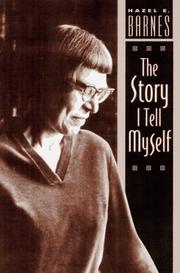
ISBN: 1299104568 0226037347 9780226037349 0226037320 0226037339 Year: 1997 Publisher: Chicago : University of Chicago Press,
Abstract | Keywords | Export | Availability | Bookmark
 Loading...
Loading...Choose an application
- Reference Manager
- EndNote
- RefWorks (Direct export to RefWorks)
Best known as the writer who introduced French existentialism to English-speaking readers through her translation of Sartre's Being and Nothingness, Hazel E. Barnes has written an autobiography that is both the success story of a professional woman as well as a profoundly moving reflection on growing older. Transcending the personal details of her life, Barnes' memoir stands as an important contribution to the intellectual history of our century. "An intimate record of our times and of the ongoing issues that challenge us to define ourselves over and over again."-Kirkus Reviews "An engaging autobiography that spans not only [Barnes'] self-identified period of 'flourishing' but virtually all the twentieth century."-Library Journal "Thoughtful, gracefully written reflections. . . . Readers will be glad they pursued an unusual woman's intellectual and personal journey."-Booklist "An accessible, wonderfully written book packed with wisdom and insight."-Denver Post "Absorbing and satisfying."-Gertrude Reif Hughes, Women's Review of Books
College teachers --- Feminists --- Existentialism. --- Existenzphilosophie --- Ontology --- Phenomenology --- Philosophy, Modern --- Epiphanism --- Relationism --- Self --- Barnes, Hazel Estella. --- Barnes, Hazel E. --- Barnes, Hazel Estella --- United States --- Biography --- Existentialism --- existentialism, memoir, biography, autobiography, women, gender, feminism, professional woman, career, aging, freedom, revelation, translation, sartre, nonfiction, barry goldwater, letters, prison, prisoner, hoax, equality, right to die, philosophy, academia, higher education, female philosopher, professor, retirement, mortality, meaning, fulfillment, religion, psychoanalysis, self-understanding, self, reflection.
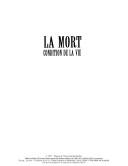
ISBN: 2760521206 1441610219 9781441610218 2760508684 Year: 1997 Publisher: Sainte-Foy [Que.] : Presses de l'Université du Québec,
Abstract | Keywords | Export | Availability | Bookmark
 Loading...
Loading...Choose an application
- Reference Manager
- EndNote
- RefWorks (Direct export to RefWorks)
PRIX DE LA MINISTRE DE L'ÉDUCATION 1997-1998 | catégorie PROMOTION DE LA CONDITION FÉMININE. En s'appuyant sur des sources abondantes et récentes, cet ouvrage propose une synthèse de plusieurs aspects de la mort qui préoccupent la société actuelle: l'intervention auprès des personnes mourantes, le deuil, la mort des enfants et des gens âgés, le suicide, en particulier chez les jeunes, le sida, les soins palliatifs, l'euthanasie et les expériences de mort imminente. En outre, cet ouvrage présente une réflexion sur les différentes conceptions de la mort depuis l'Antiquité jusqu'à nos jours. Dans
Euthanasia. --- Terminally ill --- Terminal care. --- Bereavement. --- Death. --- Assisted death (Euthanasia) --- Assisted dying (Euthanasia) --- Death, Assisted (Euthanasia) --- Death, Mercy --- Dying, Assisted (Euthanasia) --- Killing, Mercy --- Mercy death --- Mercy killing --- Homicide --- Medical ethics --- Assisted suicide --- Right to die --- End-of-life care --- Care of the sick --- Critical care medicine --- Death --- Loss of loved ones by death --- Consolation --- Loss (Psychology) --- Dying --- End of life --- Life --- Terminal care --- Thanatology --- Psychology. --- Care and treatment --- Medical care --- Philosophy
| Listing 1 - 10 of 15 | << page >> |
Sort by
|

 Search
Search Feedback
Feedback About UniCat
About UniCat  Help
Help News
News